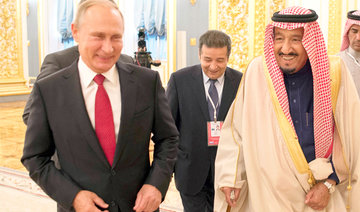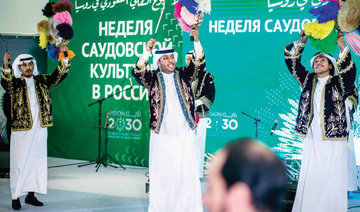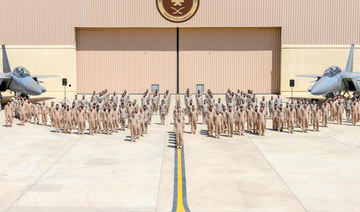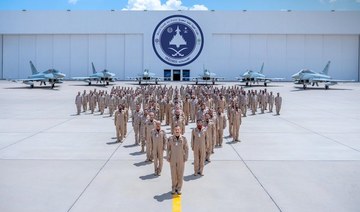MOSCOW: The Russian-Saudi Investment Forum concluded on Thursday in Moscow with announcements of joint business and investment projects.
With more than 200 Saudi and Russian business leaders and officials in attendance, the forum opened with a speech by Russian Energy Minister Alexander Novak, who called the event “historic” in light of King Salman’s first visit to Russia.
Bilateral relations “are getting to a fundamentally new level,” Novak said, adding that a joint committee had been formed “to help remove trade barriers that hinder enhancing joint ventures and projects.”
One of the most important agreements signed was on scientific and technological cooperation.
Novak announced the establishment of joint scientific and research centers, saying Russia and Saudi Arabia “have great potential in this field of bilateral development.”
There are also good prospects for cooperation in the fields of shipbuilding, the aluminum industry, water purification, food security, and oil and gas, he added.
It was announced that Russia and Saudi Arabia will establish a joint investment fund. “The $1 billion Russian-Saudi energy investment fund, which focuses on lucrative investment opportunities in Russian oil and gas production, is a good example of how we’re cooperating together and boosting our joint corporate alliances,” said Kirill Dmitriev, CEO of the Russian Direct Investment Fund, the sovereign wealth fund of the Russian Federation.
Majed Al-Qasabi, Saudi minister of commerce and investment, informed the audience that seven agreements were signed and four Russian firms will be given licenses to operate in the Kingdom.
“We’ve set up a plan to meet Vision 2030, including renewing energy and upgrading military industries,” he said.
Ibrahim Al-Omar, governor of the Saudi Arabian General Investment Authority (SAGIA), said: “We’re working on improving the level of FDI (foreign direct investment) to the Kingdom by attracting more investments. We’re working to give the private sector a bigger share in the market.”
Saudi Energy Minister Khalid Al-Falih said bilateral cooperation in the last two years has benefited the oil market by stabilizing prices.
“It has breathed back life into OPEC (the Organization of the Petroleum Exporting Countries), which found itself… unable to swing its production as supply was persistently high in 2014 and global inventories were steadily rising ahead of demand,” he added.
“The deal reached between OPEC and non-OPEC countries in November 2016 in Vienna notably helped to stabilize oil prices.”
During the forum, three Russian and three Saudi companies signed cooperation agreements on petrochemicals, trade and phosphates.
The plenary session was followed by panel discussions on bilateral investments, industry and localization, agriculture and food security.
Participants exchanged views on prospects for cooperation in these fields, and shared their experiences and future plans.
Russian-Saudi Investment Forum concludes with positive signals
Russian-Saudi Investment Forum concludes with positive signals

Joint Saudi-US ‘Protection Shield IV’ drill begins

- The drill sought to heighten awareness of chemical, biological, radiological, and nuclear risks
DHAHRAN: In a display of strategic cooperation, the Eastern Region Command in Dhahran orchestrated the latest iteration of the joint Saudi-US exercise, “Protection Shield 4.” Bringing together branches of the Saudi Armed Forces, the U.S. Central Command (CENTCOM), and a consortium of civilian and military government entities—including the Ministry of Defense’s health services, the General Directorate of Civil Defense, the Ministry of Health, and the Saudi Red Crescent Authority—the drill aimed to bolster preparedness against potential threats of mass destruction.
Colonel Turki bin Salem Al-Sumairi, overseeing the participating mixed battalion, underscored the drill’s dual purpose: to enhance the operational capabilities of all involved and to foster seamless collaboration between Saudi and US forces. Furthermore, the drill sought to heighten awareness of chemical, biological, radiological, and nuclear risks.
Field exercises formed the crux of the event, testing the efficacy of national response plans in confronting scenarios involving weapons of mass destruction. Additionally, coordination and information exchange mechanisms were scrutinized to ensure swift and effective joint responses.
Simulated ammunition was employed during the drills to simulate crisis scenarios arising from the deployment of weapons of mass destruction. Meanwhile, health services units from the Ministry of Defense, the Ministry of Health, the Civil Defense, and the Saudi Red Crescent engaged in drills aimed at enhancing collaborative efforts and refining responses to chemical and biological incidents.
Asir region is first with launch of tourism identity

- Prince Turki said the slogan “Karam Al-Arouma” was inspired by the generosity and welcoming nature of the people of the region
Saudi Arabia’s Asir region has become the first in the Kingdom to create a regional tourism identity, accompanied by the slogan “Karam Al-Arouma,” or “the generosity of the people of Asir.”
Asir Gov. Prince Turki bin Talal bin Abdulaziz, who also heads the Asir Region Development Authority, launched the identity at an official ceremony organized by the authority and hosted by the Rijal Heritage Village in Rijal Almaa governorate.
“This identity has been in the works for quite a while. It’s a very exciting day for us to finally unveil this to the world. It’s going to help our marketing efforts both domestically and internationally,“ Hashim Al-Dabbagh, the authority’s CEO, told Arab News.
“The vision of the Asir region is to be a preeminent destination year-round, and having our own identity is a step in that direction,” he said.
Asir is seeking to become a global destination throughout the year, based on its authentic culture and wide range of natural attractions.
Prince Turki said the slogan “Karam Al-Arouma” was inspired by the generosity and welcoming nature of the people of the region.
The identity was supported by the launch of the “Discover Asir” tourism website under the umbrella of “Visit Saudi,” which will provide tourist information.
Saudi Justice Ministry to host training conference

RIYADH: The Saudi Ministry of Justice is to hold the International Conference of Judicial Training in Riyadh from May 6-7.
The Judicial Training Center hosts the event which will see the participation of several international training institutes, centers, and experts in the field of judicial and legal training. The objective is to facilitate the exchange of experiences and deliberations on contemporary trends in the era of digital transformation.
Called “The Future of Judicial Training in the Era of Digital Transformation,” the event will delve into the prospects of training in the future. It will explore paths for enhancing training content; strategies for harnessing modern technology; artificial intelligence in judicial training; and effective methodologies for measuring the training’s impact.
Saudi energy minister attends Tashkent International Investment Forum

TASHKENT: Saudi Minister of Energy Prince Abdulaziz bin Salman on Thursday participated in the primary dialogue session at the third Tashkent International Investment Forum.
In the presence of the president of Uzbekistan Shavkat Mirziyoyev, the energy minister highlighted the distinguished relations between the two nations, emphasizing the leadership’s strong commitment to enhancing and expanding cooperation across all sectors, particularly energy.
The partnership aims to benefit both countries and their citizens.
Who’s Who: Ali Alhasan, CEO and founder of NanoPalm

- Alhasan co-developed deep tech to leverage large language models for biotech discovery
- He was granted the Outstanding Researcher Award from the International Institute for Nanotechnology in 2012
Ali Alhasan is CEO and founder of the company NanoPalm. He holds a Ph.D. in nanomedicine, with expertise in nano-drug delivery and gene therapy and five years of experience in executive management.
In his role as CEO, Alhasan formulates the strategic and business plans for accelerating therapy translation globally and trains talents in deep tech, nanotech, and gene editing tech.
Alhasan co-developed deep tech to leverage large language models for biotech discovery. He also co-invented Nanopalm’s biorobots for the delivery of gene editing primers and helped discover four nanomedicines for four different genetic diseases.
He is also an associate professor at King Abdulaziz City for Science and Technology and an adjunct professor at Alfaisal University, establishing collaboration agreements between the two.
As associate professor, he is the principal researcher for development and innovation in nanomedicine and the fourth industrial revolution.
In his role as adjunct professor, Alhasan teaches nanomedicine and mentors postgraduate and undergraduate students. He also co-established the Cancer Nanoscience Program.
Previously, Alhasan served in executive leadership roles at KACST as deputy at the Joint Centers of Excellence Program (2021), deputy of the Life Science and Environment Research Institute (2020), director of the Center of Excellence for Biomedicine (2020), and director of Strategic Initiatives (2016).
Alhasan was a post-doctoral scholar at the University of California in 2015 and received his Ph.D. in the Interdepartmental Biological Sciences Program from Northwestern University in 2013.
In 2008, he received a master’s degree in biotechnology also from Northwestern University, while in 2001, he received his bachelor’s degree in medical technology from King Abdulaziz University.
Alhasan was granted the Leader of the Year award from the Ministry of Communication and Information Technology in 2024. In 2018, he received the Outstanding Investigator Award from KACST.
He was granted the Outstanding Researcher Award from the International Institute for Nanotechnology in 2012.




















